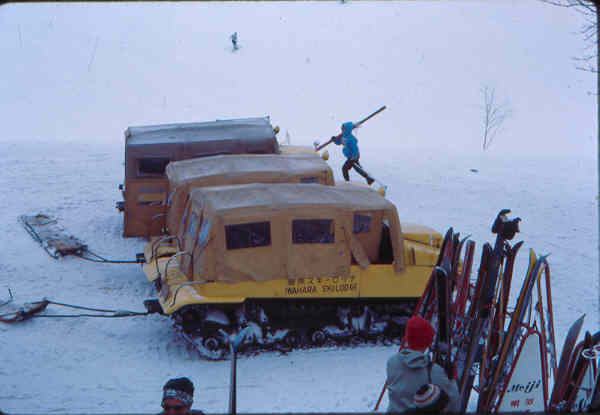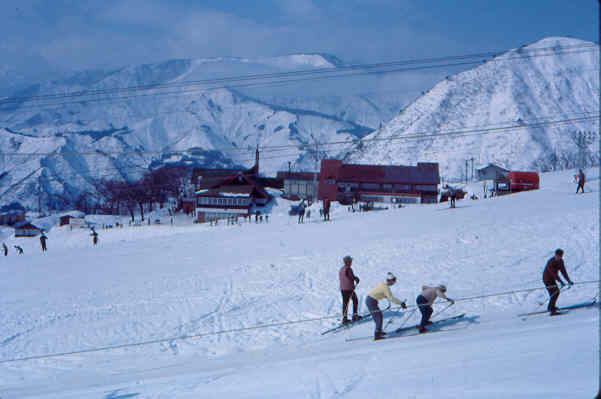R&R Reconnaissance, Someone Had to Volunteer!
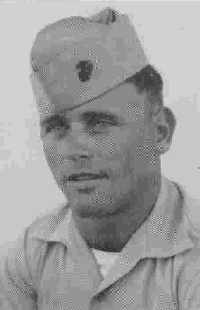 Cpl.
David Weber entered our squadron at the last moment due to a S-1 clerk
going on emergency leave. In fact, Cpl. Weber was on his way out
of the El Toro main gate to an administrative assignment with college recruiters
at the University of Wisconsin in Madison. It was a dream assignment,
to good to be true, that ended abruptly when he was stopped at the gate,
turned around, and given new orders to report to HMM-364 at MCAF, Santa
Ana. His luck went from bad to worse when he reported and found out
the squadron was leaving in 2 weeks for overseas. Cpl. Weber was
married with 3 young children and he had to work fast to change his plans
and take care of the needs of his family. This new assignment voided
all the previous accommodations. Being in an operational unit of
the Marine Corps is tough on those that are married and or have children
as there are very few foreign assignments in the Marine Corps that allow
dependents. In the wisdom of the old GySgt. that gave me advise on
the good and bad haircuts, “If the Marine Corps wanted you to have a wife,
they would have issued you one”. Cpl. Weber accepted his fate and
fell into the task of closing out his tour in Santa Ana. Dave had
gotten use to family moves as his dad was a career Navy photographer and
he had lived on various bases from southern Florida to Guam.
Cpl.
David Weber entered our squadron at the last moment due to a S-1 clerk
going on emergency leave. In fact, Cpl. Weber was on his way out
of the El Toro main gate to an administrative assignment with college recruiters
at the University of Wisconsin in Madison. It was a dream assignment,
to good to be true, that ended abruptly when he was stopped at the gate,
turned around, and given new orders to report to HMM-364 at MCAF, Santa
Ana. His luck went from bad to worse when he reported and found out
the squadron was leaving in 2 weeks for overseas. Cpl. Weber was
married with 3 young children and he had to work fast to change his plans
and take care of the needs of his family. This new assignment voided
all the previous accommodations. Being in an operational unit of
the Marine Corps is tough on those that are married and or have children
as there are very few foreign assignments in the Marine Corps that allow
dependents. In the wisdom of the old GySgt. that gave me advise on
the good and bad haircuts, “If the Marine Corps wanted you to have a wife,
they would have issued you one”. Cpl. Weber accepted his fate and
fell into the task of closing out his tour in Santa Ana. Dave had
gotten use to family moves as his dad was a career Navy photographer and
he had lived on various bases from southern Florida to Guam.
When we got to DaNang, Cpl. Weber was given the assignment
of Rest and Recuperation (R&R) NCO. He was to make sure everyone
went on an R&R somewhere and would make arrangements for them.
He was sort of the squadron travel agent. In performing this role,
he had to become familiar with the flight schedules of the various services,
their destinations, and ability to carry passengers. There was a
pretty steady stream of supplies coming into DaNang utilizing a lot of
transports without much going out in return. The trips were to Japan,
Okinawa, Manila, Hong Kong, or Bangkok. The aircraft varied from
Air Force C-119s and C-123s to Marine R4D and C-130s.
 When
the squadron first got to DaNang everyone was fresh and excited to fly
missions for medals and money. The inbound supply flights were pretty
much on a regular schedule and Dave wasn't finding any takers for outbound
returns. His fear was that his allocation of seats would be reduced
which would hurt us in the future. Dave and I (Cpl.
Warren R. Smith) bunked together and he practically begged me to go
on a flight with him to fill some seats to Japan. I asked him what
we would do in Japan and he said that is what we had to investigate for
the squadron. The chopper I was assigned was lost the week before
we got to Vietnam and I had been waiting for its replacement to arrive
via the C-124. I had been filling in on flights and maintenance as
needed, so the time was right for me.
When
the squadron first got to DaNang everyone was fresh and excited to fly
missions for medals and money. The inbound supply flights were pretty
much on a regular schedule and Dave wasn't finding any takers for outbound
returns. His fear was that his allocation of seats would be reduced
which would hurt us in the future. Dave and I (Cpl.
Warren R. Smith) bunked together and he practically begged me to go
on a flight with him to fill some seats to Japan. I asked him what
we would do in Japan and he said that is what we had to investigate for
the squadron. The chopper I was assigned was lost the week before
we got to Vietnam and I had been waiting for its replacement to arrive
via the C-124. I had been filling in on flights and maintenance as
needed, so the time was right for me.
The first day of the recon mission, February 18th,
was a long one with an early wake up and a 6½ hour flight to Iwakuni,
Japan and stops in the Philippines and Okinawa along the way. I remember
we were in short sleeve summer uniforms and when I looked out the window
after landing at Iwakuni there were large piles of snow. We didn't
even have a jacket as snow was pretty far from our minds in DaNang.
We wanted to get closer to Tokyo as we figured there would be more to see
and do than where we were at in southern Japan. While at flight operations
we signed for a morning mail flight to Atsugi NAS. We were able to
get a bunk at the transient barracks, but had missed the evening meal at
the mess hall. We went to the EM Club for a sandwich and beer as
reward for our first day of “squadron work”. If you are on R&R
you should drink beer!
We had not even gotten our food order yet, when the
SSgt. that managed the club came to us and wanted to know why we were out
of uniform. We were wondering the same thing as we had been shivering
since arrival. We told him we had just flown in from DaNang where
it was hot and summer uniforms were the uniform of the day. We had
packed up all our wool dress uniforms when we left Okinawa to go to Vietnam
and they were still stored in a warehouse there. If we could have
gotten to them we sure would be enjoying their comfort at that time.
The guy didn't know anything about the operation in DaNang, couldn't understand
the whole concept of R&R and why we were on it, and his singular
focus was still that we were out of uniform. We were not getting
through to this ”keeper of the inn” and in frustration he left us with,
“ I am going to be keeping an eye on you two, so don't cause any trouble
or I will throw your sorry asses out in the real cold.” It sure felt
good to be a combat hero among your fellow Marines.
The next morning we couldn't leave Iwakuni fast enough
for Atsugi. We went straight for the special services department
when we arrive to find out what was happening in the area. They actually
had a number of different places with a variety of activities and discounts.
We were told a really nice package was skiing in the Japanese Alps and
we could check out all the equipment we needed right at special services.
It was now pay back time with Dave. I was born and grew up in Vermont
and learned to ski before I had gone to school. I convinced the guy
from Florida and the desert if he could water ski, he could snow ski.
Off we races to the PX and bought some sweaters, wind breakers, wool socks,
and gloves. We came back to special services and they fitted us with
boots, skis and poles. They also gave us detailed instructions in
the use of the train system and made reservations for us at a ski lodge
northwest of Tokyo.
The first shock we had as we proceeded down the track
on our first leg was that all the signs identifying the stops were in Japanese
symbols. Conductors that spoke English had little red tabs on their
badges and we weren't seeing any. We kept showing our tickets to
our conductor and he kept pointing at his watch. We would show and
he would point. We figured if we asked enough times he would remember
and see we got off at the correct stop. When we got to our first
stop and transfer point he came up and pointed at the correct time, which
was the time he had been showing us, nodded his head and pointed to the
platform. Our first lesson on the Japanese train system was that
it ran on an exact schedule you could set your watch by. We changed
at Yokohama and went into Ueno Station in Tokyo. It was bigger than
Grand Central Station in New York City and as you looked down from the
various levels there were rivers of humanity flowing constantly from all
parts of the station. Dave and I were a little overwhelmed, but with
some perseverance, found the track for the train going to the ski area.
We noticed clusters of people fairly evenly spaced along the track dock,
but stood back to watch and be polite. When the train pulled in,
on time, we found out why they remain on time. The doors only stay
open for a specified time and then they closed to be on their way.
If you were 30 seconds late for a train in Japan, you weren't even close.
The people had positioned themselves at spots right in front of the doors
and when the train stopped, the doors opened and the group started pushing
through this opening. I generally found the Japanese people very
courteous, but that didn't apply to this situation. This was the
last train tonight and we start to see if we didn't push forward we would
be left at the station. The flow through the door looked like of
funnel of people and I swung my parachute bag up into the apex of this
flow. The bag was pulled through the door with me holding onto the
handle. I looked back and saw that Dave was caught at the door.
He was carrying the skis and had caught the tip and tails on the outside
of the door. Everyone was pushing on Dave and he was centered on
the skis as they were bowing in. He finally was able to slid around
them and twist them enough to clear the door just as it slammed shut.
Once aboard we found another reason for the pushing and shoving, there
were more tickets sold than seats. We had to sit back to back in
the aisle on the parachute bag holding the poles and skies vertical.
The trip was festive with a lot of drink and song. The passengers
were made up mainly of young people on their way for a fun weekend.
Whenever the train stopped vendor would pass through the train selling
rice cakes, pastries, and tea. After about 2 hours we finally got
a seat and were able to relax. At least no one came by threatening
to throw us out in the cold. Our stop at the ski area was an easy
one as it was the end of the run and the train circles around and started
back for Tokyo.
At least our transportation to the Iwahara
Ski Lodge had its name on the vehicle in Japanese and English.
There were no roads to the lodge so we went cross-country in this
tracked vehicle up the side of the mountain. The people piled
inside and the baggage and skis were pulled in a sled tied on behind.
Dave and I were the last customers in that night for the lodge as it was
about 10:00 PM. The mama son met us at the door and immediately dispatched
someone to the kitchen to get us something to eat. She must have
had sons and knew how hungry we were. No sooner than food and drink
graced our table than another young American raced over to greet us.
He introduced himself as a Navy pilot off the Kitty Hawk visiting Yokohama
and he had been at the lodge since Monday as the only American. He
said if no “round eyes” had showed up by Saturday, he was leaving.
He talked non-stop for 2 hours without us getting a word in edgewise.
All those English words had dammed up inside of him and when he saw us,
they had to spill out. He said he had sat for hours in the evening
drinking beer and listening to the people sing Japanese songs having a
good time without him. It was apparent we had just become his best
friends. When our new best friend finally ran down, we all decided to call
it a night. Our rooms were little individual cubicles with a bunk
type bed, a small table, and chair. There was a fresh kimono and
shower shoes to wear to the public bath that covered most of the basement.
The meals were part of the package or you could order
special off the menu.
After breakfast, Dave found out that I lied about snow
skiing was like water skiing. He said for one thing, there was nothing
to hold on to and it hurt a lot more when you fell down. One time
I saw a crowd gathering around a big snow pile in front of the lodge.
When I got there a couple of guys were pulling on some legs attached to
skis. After quite an effort out of the pile Dave was pulled to a
grand applause. He said he got headed toward the lodge and didn't
know how to stop so he dove head first into the pile. He went in
so far that he could get back out until outside assistance was given.
Dave wasn't always sure what direction he was headed or where he would
end up. He stuck at it and by the second day he was doing a lot better.
Many times we would see Dave plodding down the mountain and each Japanese
he would come to would point further down the slope. He would lose
a ski and it would go forever till someone intercepted it. The Japanese
are so polite they would start apologizing before they would run into you.
When we were skiing with Dave the people behind us weren't sure which way
we would be going and neither did Dave. You would hear them yell
out “gomen nasai, gomen nasai” before they ran into you. Gomen nasai
means I'm sorry. There would be a lot of bowing and more gomen nasai
before all would be on their way.
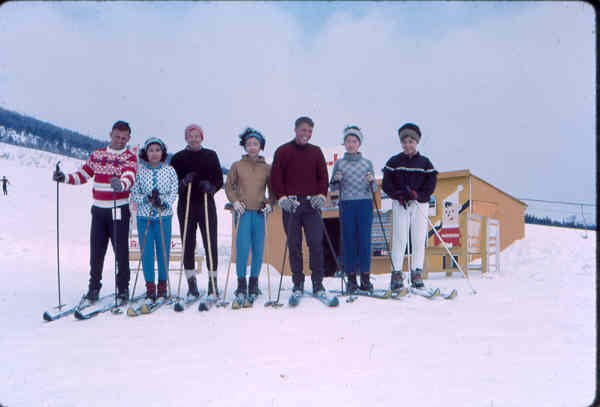
Families we met would want to have their picture taken
with us and they used their kids as interpreters. The children in
Japan were required to take English in school. The people that were
leaving early would give us unused lift passes and everyone made us feel
right at home. There were some sweet young
ladies from Tokyo staying at the lodge that thought it was pretty special
to ski with some Americans their age. The guy on the left is David
Weber, then the LtJg. from the Kitty Hawk and then myself. The girls
were from Tokyo and were staying at our lodge. They reminded me of
little bunnies out there on the slopes and were good skiers. We had
a good time sharing our R&R with them and by this time Dave was starting
to at least look like a skier when having his picture taken.
The slopes were lighted and stayed open till 9 or 10
PM, which gave you all the skiing you wanted.
The basement house a large public bath and we would
sit in the warm water letting all the sore, tired muscles unwind from the
day. We sat for the longest time trying to talk to a group of Japanese
businessmen in the pool with us. We knew a little Japanese and they knew
no English. It took a long time, but every once in awhile we were
able to transmit a thought with the help of our few words and a lot of
sign language. When that happened all would slap the water with great
exuberance. I think we made a lot of friends because we tried to
be a part of their group and communicate with them on an equal basis.
I never thought at the time we would someday be watching the winter Olympics
from this same area.
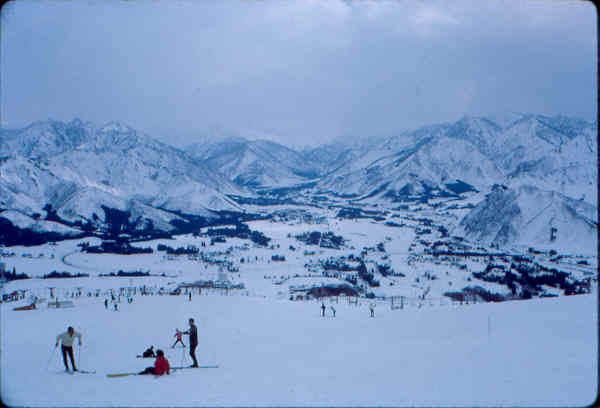
We had beautiful clear days all the time we were there
and it was hard to think about going back. We were ringed by the Japanese
Alps and you could see the train come up the valley and make its loop
to head back to Tokyo. We were up so high that every thing was toy like
and make believe. Everything had a soft white crystal clean look.
This definitely was not DaNang. We felt confident we could recommend
this to anyone, even if they couldn't ski.
We skied into the 3rd day before we had to settle up
and leave for Atsugi. The total cost for the 3 days of room and board
was $18.00. I don't think that would buy a hamburger today.
We were veterans now, so the return trip was uneventful with the exception
we had real seats all the way back and Dave had learned how to get in the
doors with skis without hanging them up.
We even smarten up at the Iwakuni EM Club. We
wore or ski sweaters and pants and went unnoticed by our friendly “inn
keeper”.
When the back ramp lowered on the C-130, as we taxied
up to the HMM-364 area, the blast of dusty, hot air popped the bubble we
had been living in for the past few days. The workload was heavy
and our extra hands were folded back into the routine immediately.
On really hot, muggy, dirty days, if I tried real hard, I could transport
myself back to the top of that clean, crispy cool mountain in Japan.
I also knew sometime we would return to a better world where we would hear
behind us the words gomen nasai instead of a gunshot.
Submitted by:
Warren R. Smith, former Cpl. USMC
Back Browser or Home
x
 Cpl.
David Weber entered our squadron at the last moment due to a S-1 clerk
going on emergency leave. In fact, Cpl. Weber was on his way out
of the El Toro main gate to an administrative assignment with college recruiters
at the University of Wisconsin in Madison. It was a dream assignment,
to good to be true, that ended abruptly when he was stopped at the gate,
turned around, and given new orders to report to HMM-364 at MCAF, Santa
Ana. His luck went from bad to worse when he reported and found out
the squadron was leaving in 2 weeks for overseas. Cpl. Weber was
married with 3 young children and he had to work fast to change his plans
and take care of the needs of his family. This new assignment voided
all the previous accommodations. Being in an operational unit of
the Marine Corps is tough on those that are married and or have children
as there are very few foreign assignments in the Marine Corps that allow
dependents. In the wisdom of the old GySgt. that gave me advise on
the good and bad haircuts, “If the Marine Corps wanted you to have a wife,
they would have issued you one”. Cpl. Weber accepted his fate and
fell into the task of closing out his tour in Santa Ana. Dave had
gotten use to family moves as his dad was a career Navy photographer and
he had lived on various bases from southern Florida to Guam.
Cpl.
David Weber entered our squadron at the last moment due to a S-1 clerk
going on emergency leave. In fact, Cpl. Weber was on his way out
of the El Toro main gate to an administrative assignment with college recruiters
at the University of Wisconsin in Madison. It was a dream assignment,
to good to be true, that ended abruptly when he was stopped at the gate,
turned around, and given new orders to report to HMM-364 at MCAF, Santa
Ana. His luck went from bad to worse when he reported and found out
the squadron was leaving in 2 weeks for overseas. Cpl. Weber was
married with 3 young children and he had to work fast to change his plans
and take care of the needs of his family. This new assignment voided
all the previous accommodations. Being in an operational unit of
the Marine Corps is tough on those that are married and or have children
as there are very few foreign assignments in the Marine Corps that allow
dependents. In the wisdom of the old GySgt. that gave me advise on
the good and bad haircuts, “If the Marine Corps wanted you to have a wife,
they would have issued you one”. Cpl. Weber accepted his fate and
fell into the task of closing out his tour in Santa Ana. Dave had
gotten use to family moves as his dad was a career Navy photographer and
he had lived on various bases from southern Florida to Guam.
 When
the squadron first got to DaNang everyone was fresh and excited to fly
missions for medals and money. The inbound supply flights were pretty
much on a regular schedule and Dave wasn't finding any takers for outbound
returns. His fear was that his allocation of seats would be reduced
which would hurt us in the future. Dave and I
When
the squadron first got to DaNang everyone was fresh and excited to fly
missions for medals and money. The inbound supply flights were pretty
much on a regular schedule and Dave wasn't finding any takers for outbound
returns. His fear was that his allocation of seats would be reduced
which would hurt us in the future. Dave and I 